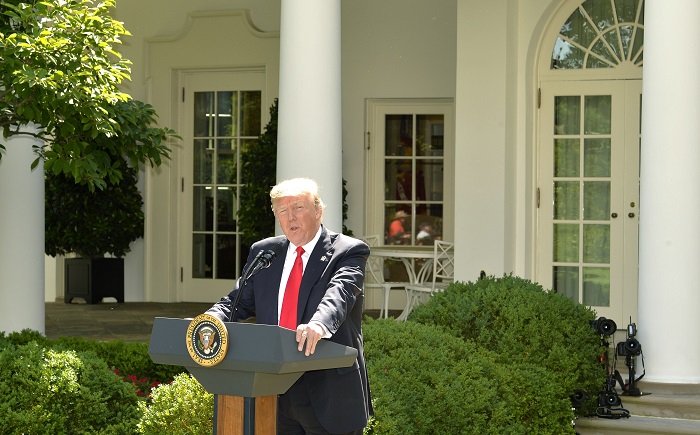White House defends Trump over lawsuit on violation of anti-corruption rules
Published : 13 Jun 2017, 06:53
Updated : 14 Jun 2017, 00:32
U.S. capital city Washington D.C. and nearby state Maryland on Monday filed a lawsuit against President Donald Trump, alleging he violated clauses in the Constitution by accepting millions of U.S. dollars in payments and benefits from foreign governments since his inauguration.
The lawsuit, the first of its kind brought by government entities, was launched by Washington D.C. Attorney General Karl Racine and his Maryland counterpart Brian Frosh. It claims Trump violated two anti-corruption rules in the Constitution that prohibit the president from pulling in profits from businesses he owns, controls or prospers from.
"An emoluments lawsuit against Trump has been filed by D.C. and Maryland. It is time to open a House Judiciary Committee inquiry," Sheila Jackson Lee, a Democratic member of the committee, tweeted.
In response, White House Press Secretary Sean Spicer attacked the lawsuit as motivated by "partisan politics" during his daily press briefing.
"This lawsuit is just another iteration of the case filed by that group CREW, filed by the same lawyers," Spicer said, referring to a government watchdog group that first sued Trump over the issue in January.
"It's not hard to conclude that partisan politics may be more the motivations behind the scenes," he added.
Ahead of the Monday lawsuit, the U.S. Department of Justice filed a 70-page legal brief on Friday arguing that Trump's businesses are legally permitted to accept market-rate payments from foreign governments while he is in office.
However, the two attorney generals argue there are "unprecedented constitutional violations" by Trump and that both Washington D.C. and Maryland are being adversely affected by the Trump International Hotel near the White House.
Trump has broken many promises to keep separate his public duties and private business interests, according to the two, citing Eric Trump's remarks that his father would continue to receive regular updates about his company's financial health in the White House.
Trump's continued ownership of a global business empire has rendered the president "deeply enmeshed with a legion of foreign and domestic government actors" and has undermined the integrity of the U.S. political system, the lawsuit claimed.
If a federal judge allows the case to proceed, the two attorney generals say, one of the first steps will be to demand through the discovery process copies of Trump's personal tax returns to gauge the extent of his foreign business dealings.
To fully know the extent of Trump's constitutional violations "we'll need to see his financial records, his taxes that he has refused to release," they said.
However, that fight would most likely end up before the Supreme Court, with Trump's attorneys having to defend why the returns should remain private, local media quoted the two as saying.
The lawsuit is the latest and most significant legal challenge to Trump over the issue of emoluments and thought to become another legal headache for Trump following special counsel Robert Mueller's probe into possible Russian meddling in the U.S. presidential campaign and court challenges to the president's controversial travel ban.
In January, a watchdog group called Citizens for Responsibility and Ethics in Washington launched the first lawsuit in this kind, followed by a D.C. restaurant in March alleging the Trump International Hotel benefits from unfair advantages because of its close association with the president.
A group of Congress Democrats also said last week that they were planning to file similar suit soon, according to local media reports, noting that each of the suits has faced legal hurdles over standing to sue the president.


